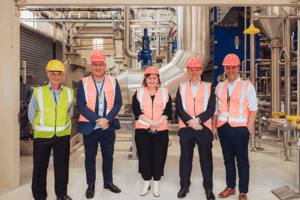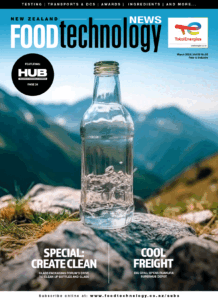
The MVR project, which has been fully operational for just six weeks, was co-funded through the Government Investment in Decarbonisation (GIDI) Fund and enables Chelsea to recover and reuse energy normally lost through the evaporation process. The new process is 18 times more efficient than single step evaporation.
In 2020, in partnership with EECA (Energy Efficiency and Conservation Authority), Chelsea undertook an Energy Transition Accelerator (ETA) study where the MVR Project was identified as a viable emission abatement solution.
“The results of our ETA study were pivotal in allowing us to identify areas where we could make significant strides in our emissions abatement and in turn allow the business to set ambitious emission reduction goals,” says Bernard Duignan, CEO, New Zealand Sugar Company.
Chelsea has been refining sugar at its site on the northern shore of Auckland’s Waitemata Harbour since 1884 and is one of the first sugar refiners in the world to harness this technology in its production process.
“Chelsea has been an integral part of New Zealand’s food and beverage manufacturing sector for over a century. Producing around 205,000t of product every year for both domestic and export markets. We are very much a business with our sights set on the next 100 years and continuing to improve in a sustainable and relevant way,” says Duignan.
“The MVR Evaporator represents a big leap forward in our sustainability goals. By 2030 we will have reduced our greenhouse gas emission by more than 30%, and we have committed to be Net Zero Carbon by 2050.”
Nicki Sutherland, general manager business at EECA says organisations like Chelsea Sugar – who are leading the way in efficient and low emission energy use – are a powerful example to others.
“GIDI encourages innovation by supporting early adopters of clean and clever technologies that demonstrate wide replication and emissions reduction potential.
“Starting early and planning the path ahead is essential. Projects like Chelsea Sugar’s benefit our climate at the same time as benefitting the business through reducing its energy use and operational cost – and allowing it to genuinely claim sustainable credentials.
“What stood out for EECA is that Chelsea sugar implemented the project within 18 months from GIDI approval and delivered the project as agreed on time and budget, despite the impacts of Covid. This will be a great boost to undertaking further decarbonisation projects.”






























































































